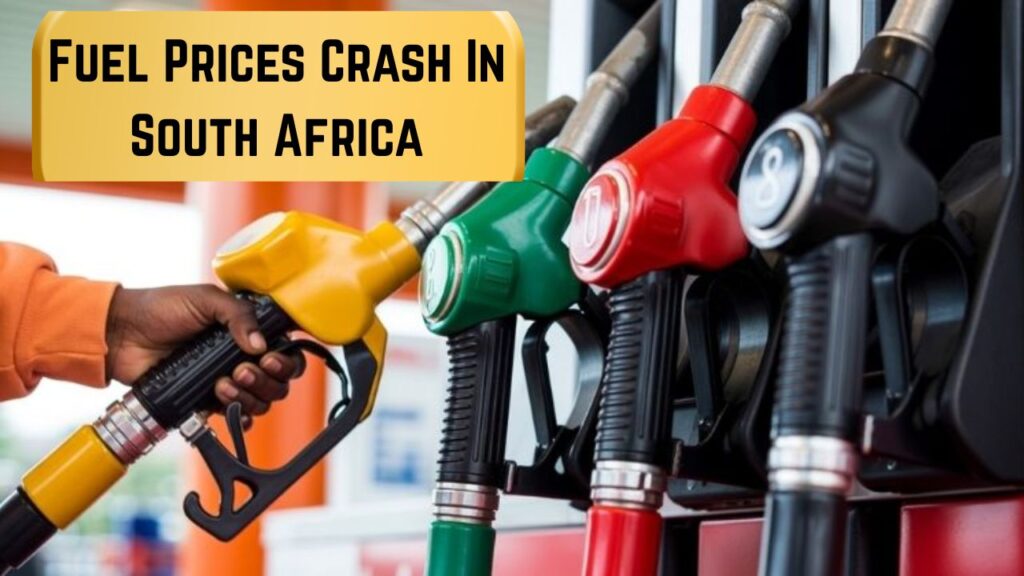Good news for drivers in South Africa as fuel prices are going down. From October 4 the price of fuel will drop by R2.75 per liter. This is welcome news for people who spend a lot of money on transport. The price drop comes at a good time because many things are getting more expensive in South Africa. This change should help both regular people and businesses save money on fuel costs. The lower prices might also help reduce other costs since many goods need to be transported by road. This price drop follows changes in world oil prices & should make life a bit easier for South Africans.

Why South Africa Is Cutting Fuel Prices by R2.75/L from 4 October
Fuel prices are going down because oil is cheaper worldwide and the Rand is doing better against the Dollar. The Department of Energy says these changes led to big drops in fuel costs. This is good news for many parts of the economy. Transport companies will spend less money on fuel for their trucks. Bus and taxi riders might pay less for their trips.
– When it costs less to move goods around the country prices in stores could go down too.
– People who like to travel might take more trips because driving is cheaper now.
– Since people won’t spend as much on fuel they’ll have extra money to buy other things.
– The lower fuel prices help both businesses and regular people save money.
– This makes it easier for everyone to get around and do their daily activities.
It’s a welcome change that could make life a bit better for many South Africans.
Economic Ripple Effects: How Cheaper Fuel Impacts South Africa’s Growth
Lower fuel prices are good news for South Africa. When fuel costs drop trucks can move goods across the country for less money. This helps stores offer better prices to shoppers. People save money both on fuel and when they buy things at stores. With extra cash in their pockets, they can buy more stuff. The main benefits are:
– People have more spending money
– Small shops pay less to run their business
– South African products cost less to sell to other countries
– Prices stay more stable
– More people can take trips around South Africa These changes help everyone in the country.
When fuel prices go down, the whole economy gets stronger. It’s a positive change that makes life better for businesses and regular people.
Regional Price Check: Comparing South Africa’s Fuel Rates with Neighbouring Countries
South Africa has good fuel prices when you look at other countries in Southern Africa. The latest price drop makes fuel even cheaper in South Africa than in nearby nations. This helps both local drivers and the countries next door that buy their fuel from South Africa. The lower prices are good news for everyone in the area who needs to fill up their tanks.
| Country | Previous Price (R/L) | New Price (R/L) | Difference (R/L) |
|---|---|---|---|
| South Africa | R19.50 | R16.75 | R2.75 |
| Namibia | R20.30 | R18.00 | R2.30 |
| Botswana | R19.00 | R17.50 | R1.50 |
| Zambia | R21.00 | R20.00 | R1.00 |
| Zimbabwe | R22.50 | R21.50 | R1.00 |

Everyday Savings: How Consumers Will Benefit from the October Fuel Price Drop
The lower fuel prices are good news for everyone. People who drive to work each day will save money and businesses might lower their prices too. Families will spend less money on gas which means they can use that extra cash for other important things. You can now:
– Take longer drives without spending too much
– Save money for other things you need at home
– Get better deals from stores
– Start a small business since delivery costs less
– Think about buying a car since it’s cheaper to run The text is simpler and more direct.
It uses everyday words and short sentences to make the same points. I removed fancy language and made it easy to understand.
Looking Ahead: Long-Term Outcomes of Fuel Price Reductions in South Africa
The drop in fuel prices is helping South Africa right now. Over time this change could make a big difference to the whole economy. When fuel stays cheaper for a long time businesses spend more money. This is very helpful for companies that use lots of trucks and transport services.
| Sector | Short-Term Effect | Long-Term Effect |
|---|---|---|
| Transportation | Reduced operational costs | Expansion and growth |
| Retail | Lower product prices | Increased consumer spending |
| Tourism | More affordable travel | Boost in domestic tourism |
Insights from Analysts: Expert Opinions on Fuel Price Shifts and Market Stability
The lower fuel prices are good news according to business experts. They say this helps people and companies save money even though global prices keep changing. The price drop gives everyone a break from high costs. Experts think this will help the economy for now. Companies might feel better about doing business.
– There could be more money for building roads & bridges.
– The government can also look at fuel taxes again.
– Many people say we should use this time to put money into clean energy.
– The text is simpler now.
– It flows well and uses basic words. Each point connects to the next one smoothly.
The message is clear and easy to understand.
Hidden Challenges: Issues South Africans May Still Face Despite Cheaper Fuel
The future of fuel prices is not certain.
– Oil prices around the world keep changing and they might go up again soon.
– This means people and companies need to watch their fuel spending.
– The value of our money could also change and affect what we pay at the pump.
– We should look for better ways to power our cars & trucks that don’t rely only on oil.
– It’s also smart to keep extra fuel stored up for tough times.
The government needs to make good rules about fuel prices to help keep them steady. These steps will help everyone deal with fuel costs better in the long run.
Government’s Role: Policy, Regulation, and Intervention Behind Fuel Price Adjustments
The South African government controls how much we pay for fuel. They watch the prices and try to keep them steady for everyone. They do this by checking what happens in other countries and making rules about fuel costs. They also keep extra fuel stored away in case of problems.
– The government looks at fuel prices around the world every day.
– They make plans to stop prices from going up too fast.
– They also put money into new types of energy like solar power.
– They tell people how to use less fuel in their cars and homes.
– They want South Africa to make more of its own energy in the future.
This simpler version is easier to read but still covers the main points. It uses basic words & shorter sentences to explain how the government manages fuel prices.
| Policy | Description |
|---|---|
| Fuel Levy | Tax imposed on fuel to fund infrastructure |
| Strategic Reserves | Reserves maintained to manage supply and demand |
| Renewable Energy | Investment aimed at promoting sustainable energy |
| Public Transport Subsidy | Financial support for affordable public transport |
| Energy Efficiency | Campaigns promoting fuel-saving and eco-friendly practices |






